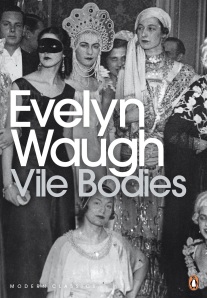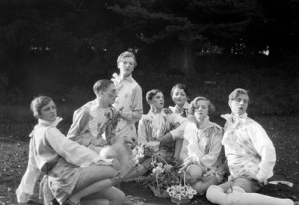 If I had passed by The (In)Eligible Bachelors in a shop window, I probably wouldn’t have looked at it twice. Some people call that being a snob; but honestly, it’s just a time-saving measure for me. My ‘To Read’ list runs into hundreds and I would rather just pick up something recommended by a critic I respect. However, the flipside of reading in this manner is that while one is protected from truly awful books (One Night at a Call Centre, anyone?), one also misses out on books that everyone else seems to have read and is passionately talking about. It happened to me with The Immortals of Meluha (which I finally read last week and WILL blog about!), The Help, Eat, Pray, Love and The Shadow of the Wind. I don’t know if you agree, but it’s important to sometimes climb down from the ivory tower and get with the zeitgeist.
If I had passed by The (In)Eligible Bachelors in a shop window, I probably wouldn’t have looked at it twice. Some people call that being a snob; but honestly, it’s just a time-saving measure for me. My ‘To Read’ list runs into hundreds and I would rather just pick up something recommended by a critic I respect. However, the flipside of reading in this manner is that while one is protected from truly awful books (One Night at a Call Centre, anyone?), one also misses out on books that everyone else seems to have read and is passionately talking about. It happened to me with The Immortals of Meluha (which I finally read last week and WILL blog about!), The Help, Eat, Pray, Love and The Shadow of the Wind. I don’t know if you agree, but it’s important to sometimes climb down from the ivory tower and get with the zeitgeist.
All of the above is just to make clear my reasons for reading and reviewing The (In)eligible Bachelors by Ruchita Misra. No, I don’t have water in my brain. I just think it’s fair to give new authors a chance, no?
So, The (In)eligible Bachelors is a romantic comedy, written in the form of diary entries and has a fairly run-of-the-mill plot. Kasturi Shukla is a recent MBA graduate who has bagged a great job in Delhi. Kasturi is keen to be the young, ambitious career-woman, with no time for romantic dalliances, but her mother has other ideas. She thinks that her daughter, who is 24 years old, needs to get married and so she pushes her into a series of disastrous dates with “eligible” bachelors. Kasturi herself, however, is falling head over heels in love with her boss Rajeev, and he seems to reciprocate her feelings. It then becomes a question of how she can convince her mother to let her marry Rajeev. Along the way, Kasturi and her friends Varun and Ananya have a number of adventures, including office PPT disasters, a road accident and kidnap and assault. They become friends with the quirky ‘Pita Ji’ and Purva Dikshit, the brooding doctor with a painful past who seems to harbour romantic feelings for Kasturi.
The book’s biggest strength is it’s pace. Misra has thrown in any number of office gags, romantic scenes and twists in order to keep the reader hooked, and it works. I finished the book in one sitting, because I really wanted to know exactly how Kasturi finds the true love of her life. I already knew who it was going to be – that became pretty obvious in one of the early chapters. The other thing I liked about the book was the depiction of Kasturi’s work life. As a new recruit, she naturally dreams about successfully handling major responsibilities and rising fast to the top of the ladder. Much to her chagrin, however, most of her work seems to require digging up old PPT slides and tweaking them in order to make presentations to the company’s top brass. It’s no wonder then that Kasturi decides to make better use of her time by mooning over her unbelievably good looking boss and getting up to tricks with her friends Varun and Ananya. There’s some good humour in the office scenes, especially the one where Varun and Kasturi seek permission to use the company’s conference room for a finance workshop. What they actually want to do is discuss their mutual friend Ananya’s mysterious new boyfriend, and Varun has even created an elaborate slideshow for the occasion ( the details are killer, including Humko Tumse Pyaar Kitna, which is playing in the background).
I won’t complain about the plot, clichéd though it is. After all, the same story has been used a number of times by other writers and filmmakers. I also won’t complain about the language, which could do with a LOT of polishing. What I will complain about is the execution. The book is all froth, with no real substance beneath it. With a topic as clichéd as arranged marriage, Misra could have attempted something more different and individual by giving greater insights into the concept itself and approaching the romance from a different angle. As I said, she really shines in the parts that are set in the office, but the ‘Greek God’ boss is a stereotype she could have easily avoided. As soon as it is mentioned that Kasturi’s boss is on leave when she joins the company, we know that he’s going to be a dashing sort of fellow who sweeps Kasturi off her feet the moment they meet. And that is exactly what happens. And when a person with a scarred hand – whose face Kasturi doesn’t see – helps her to her feet in one of the first few chapters, we know that hand is going to be playing a major role in the plot, and will turn out to be Mr Right.
But the biggest irritant for me was the tone of the book. None of the ‘diary entries’ actually read like diary entries. They don’t have the appropriate structure or the right kind of intimate voice. Sample this opening paragraph of one such entry:
“Hmm,” said Rajeev sir, thoughtfully.
I looked at his handsome face. I saw his eyes follow an attractive looking girl walking past us. We were again standing near India Gate, the sky was a dark shade of inky blue with stars twinkling all over.
Who writes diary entries that begin like that, with a quote? This is the opening of a story chapter! Another diary entry is from a discotheque. We know this from Kasturi’s habit of providing time and date for each entry. So on November 13, 2009 at 9 pm, she writes about her friends inviting her to a discotheque. Then at 9:30 pm she writes that she is in the hallway outside her room. At 10:30 pm she writes that she is at the ‘theque and that everybody is sweaty and the music is too loud. At 10:32 pm, her heart stops beating for a second because she thinks she sees someone familiar. At 10:45 pm, she hears a girl squealing. At 10:46 pm, she hears the girl giggle. At 10:48 pm, she sees a singular sight and is shocked into silence. At 10:49:30 she clears her throat before she addresses the couple she has caught in flagrante delicto. Now unless Kasturi has her diary and a pen attached to her arm, there’s no way she can be giving us a minute-by-minute account of her night at the discotheque. It’s not like it’s Twitter.
Misra should have avoided this format. Diary entries in fiction can be tricky, and should only be attempted by an accomplished writer (Bram Stoker did this wonderfully in Dracula). If Misra wanted to retain Kasturi’s unique voice, she could have simply used a more traditional first-person narrative structure.
Overall, though, I don’t hate the book. It could have done with tighter editing, and a more insight, but at least it takes only about four hours to finish. If you feel four hours is a lot, then avoid this book. But if you enjoy fluffy, no-brainer sort of fiction, by all means read it. In fact, from the reader reviews I checked on Goodreads.com, the book seems to have touched a chord with a lot of young Indians. That should be welcome news to Ruchita Misra.
This review is a part of the Book Reviews Program at BlogAdda.com. Participate now to get free books!








